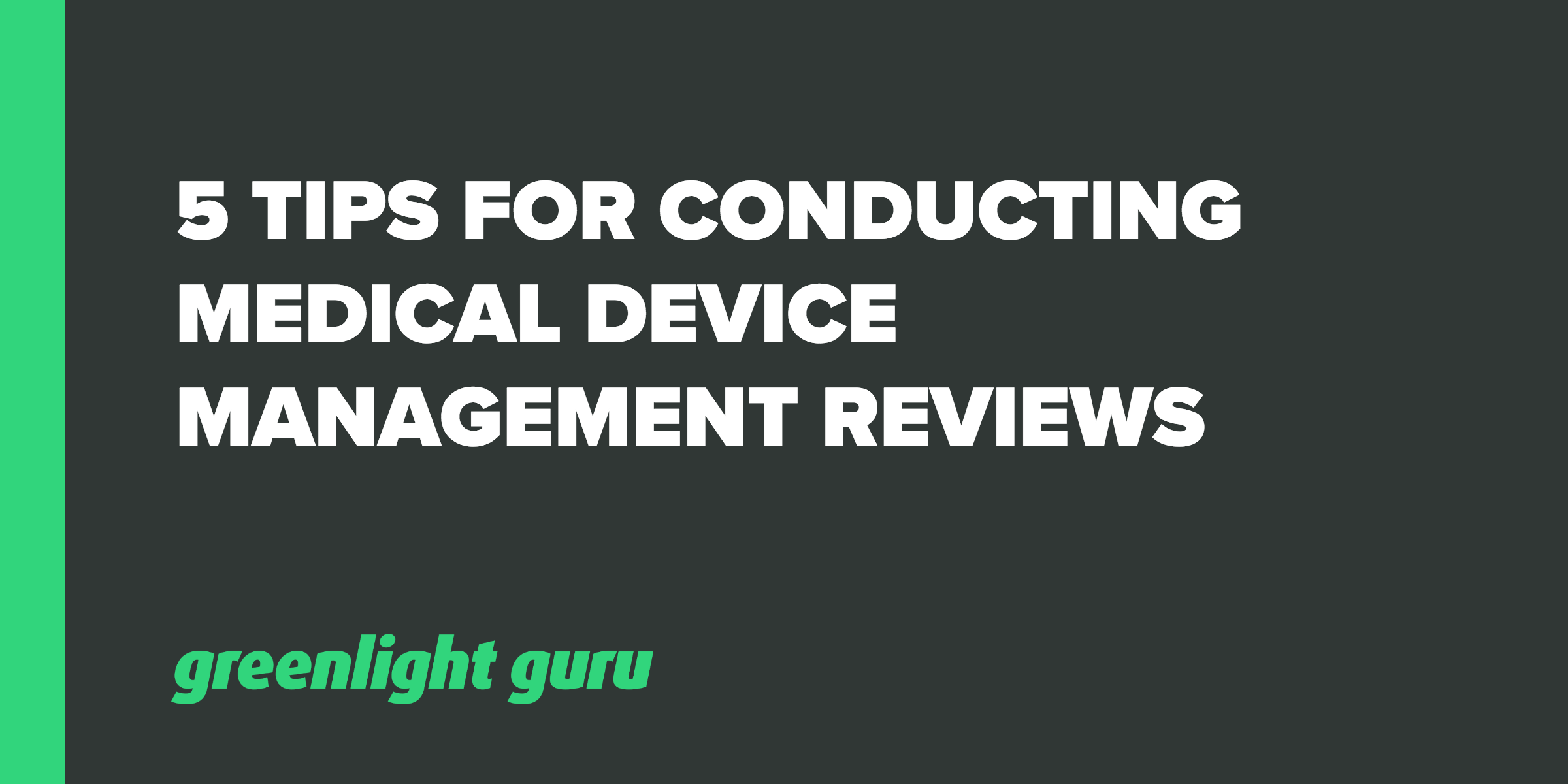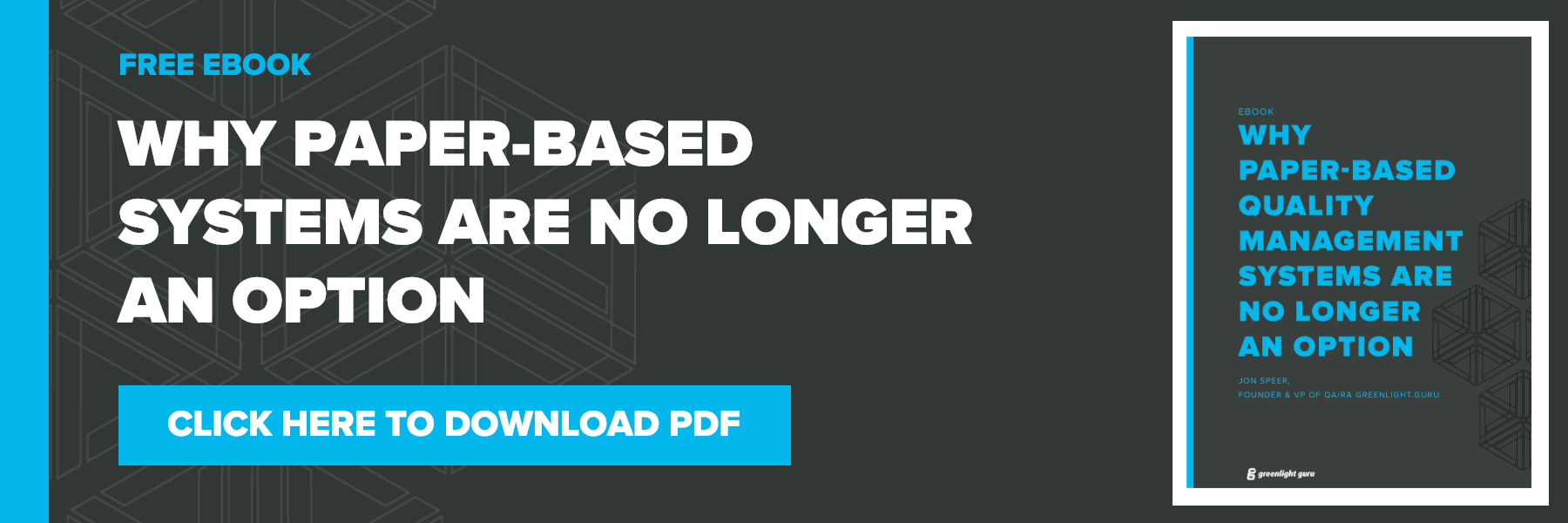
When was your last company management review?
If you’re left scratching your head, it either may not apply to you yet (which we’ll get into) or it’s more than likely way past time you had one.
In the medical device industry, management reviews are not entirely at the discretion of company policy, they’re a regulatory requirement and actually provide a good opportunity to keep a finger on the pulse of the company.Let’s take a look at what a management review entails and some tips we have for ensuring they are conducted effectively:
What is a Management Review?
The big driver behind management reviews is that the regulatory bodies have an expectation for executive management to be involved with the creation, implementation, and management of a company's quality management system to ensure effectiveness.
Your management review is a snapshot in time of your company and shows that the executive management is following the expectations of reviewing and assessing the performance of your quality management system (QMS). This requires KPIs and system information to tell the story of whether or not the QMS is working.
The management review is a deep-dive into your QMS processes, which can be viewed much like getting a physical at a doctor's office. The aim is to get an overall view of the health and effectiveness of your QMS.
Isn’t this the Same as an internal audit?
Well, no. Internal audits are more singularly focused. An internal audit assesses individual processes (for example your design controls) and look to prove that you’re following correct steps. This means that you usually have multiple internal audits to address your entire QMS.
The subtotal of all of these internal audits feeds as an input into your management review, along with things like complaints and CAPAs. The management review will want to build an overall picture, such as whether some products have more issues than others or how many issues are escalating to CAPAs.
How Often Should a Management Review Occur?
The regulatory requirements for medical device companies indicate that the management review should be done once per year. The thing with this is that there is the temptation to ignore it until that one particular date (often at the last minute towards the end of the year) and then it becomes another quality requirement that is relegated to being a checkbox item.
For this reason, we suggest that management reviews should be conducted more frequently. The idea is to develop a mindset that quality is important all the time and is a way of life for your company.
Variables that help to decide how often a management review is appropriate for your company might include the size of your operation and how many issues you have experienced. It may make sense to conduct management reviews quarterly. At the very least, my recommendation is to hold management reviews at least twice per year.
What Is the Scope of a Management Review?
First of all, it is expected that most of your C-suite team will be involved, including the CEO. You should also include a cross-section from functions within your business, which might include manufacturing, quality, regulatory, engineering, sales, and marketing team members. The idea is to get that broad view across the functions of your business.
Your review should aim to identify leading and lagging indicators as to the health of your business. For example, you will look at non-conformances, any quality or manufacturing issues, complaints and point-of-use issues, internal audits, product development processes, design controls and whether risk management efforts are aligning with how the products are performing.You will also want to analyze your CAPA program and note how many are being issued and whether there are any spikes in corrective or preventive activities.
NOTE: If you are still in the development process and have no products at market yet, you may not have a formal management review. This is where your design reviews come in as a check. Management reviews are generally a post-market activity.
Tips for Effective Management Reviews
Ok, so you want to ensure that management reviews are conducted effectively and that you get the most value out of them. They’re not just a regulatory requirement, they can provide you with valuable insights into the health of your company.
Here are 5 of our top recommendations for conducting effective management reviews:
1. Conduct them frequently
As mentioned, don’t let them become a checkbox activity that you’re only doing because “the FDA said so.” Have your reviews at least twice per year or more if the size of your company and number of issues coming up require it.
2. Identify your KPIs
Each process within your business should have a set of KPIs attached in order to monitor the overall health and effectiveness of the process. These KPIs should be used as a gauge in management reviews to identify areas which require more help.
Note that KPIs shouldn’t just come up at management review time. As part of your overall quality processes they are probably being monitored much more frequently. For example, your VP of Quality might own CAPA and set particular targets (let’s say they want to establish a root cause for issues within the first 10 days).
Obviously, this example would involve KPIs being monitored more frequently because you’re not going to wait three or six months for a 10 day-based KPI. Results could be shared with management review participants via email or a member dashboard that your company sets up.
Set thresholds for where you expect things to be and continually monitor key processes between meetings to keep participants engaged. There shouldn’t be surprises in a management review.
3. Use electronic data management
It’s common for companies to use logs and spreadsheets to track KPIs and events, which is quite manual and burdensome. It can be tricky pulling together all of the data that you need and ensuring that data is in a format that is user-friendly for the purposes of your management review.
It is much easier to use an electronic system if possible to keep your data within easy reach.
As we have found, accessibility and ease of use can play a big role in how effectively reviews are conducted and certainly how often companies actually want to do them. No one enjoys a paperwork ordeal!
4. Have an agenda
Like any good meeting practice, having an agenda is important for conducting an effective management review. It is important to make sure that the agenda is consistent from one meeting to the next. This keeps everyone on the same page as to what is expected and what they need to be following up or looking into.
5. Keep meeting minutes
This is really a key point to stress here. If you are subjected to a FDA inspection and ISO audits, you need minutes and notes of your management review activities.
Here’s the thing to know though, you must provide objective evidence during a FDA inspection that you are conducting management reviews, but you aren’t required to actually show them your minutes. A common practice to address this is to show the FDA inspector a cover page that includes your meeting agenda and who attended. Usually you would sign and date this page.
However, if you are going through an ISO audit, realize that ISO auditors can and will ask to see the detailed minutes of your meetings.
Final Thoughts
Management reviews are a compulsory post-market activity for medical device companies. They should be conducted at a minimum of once per year, but we strongly recommend doing them more often.
For one thing, you keep a better overall eye on what’s happening in the business. Secondly, you can take earlier action on issues that arise. Thirdly, they are part of creating a culture within your business that views quality management as a way of life, and won’t be such a big deal to prepare for if they are a regular feature.
Keep good minutes and involve a cross-section of functions. This way you not only satisfy regulatory requirements, but you get the right sort of valuable information you need.
Still using a manual or paper-based approach to manage your design controls or quality processes? Click here to learn more about how Greenlight Guru's modern eQMS software platform exclusively for medical device companies is helping device makers all over the globe in more than 50 countries get safer products to market faster with less risk while ensuring regulatory compliance.
Jon Speer is a medical device expert with over 20 years of industry experience. Jon knows the best medical device companies in the world use quality as an accelerator. That's why he created Greenlight Guru to help companies move beyond compliance to True Quality.









